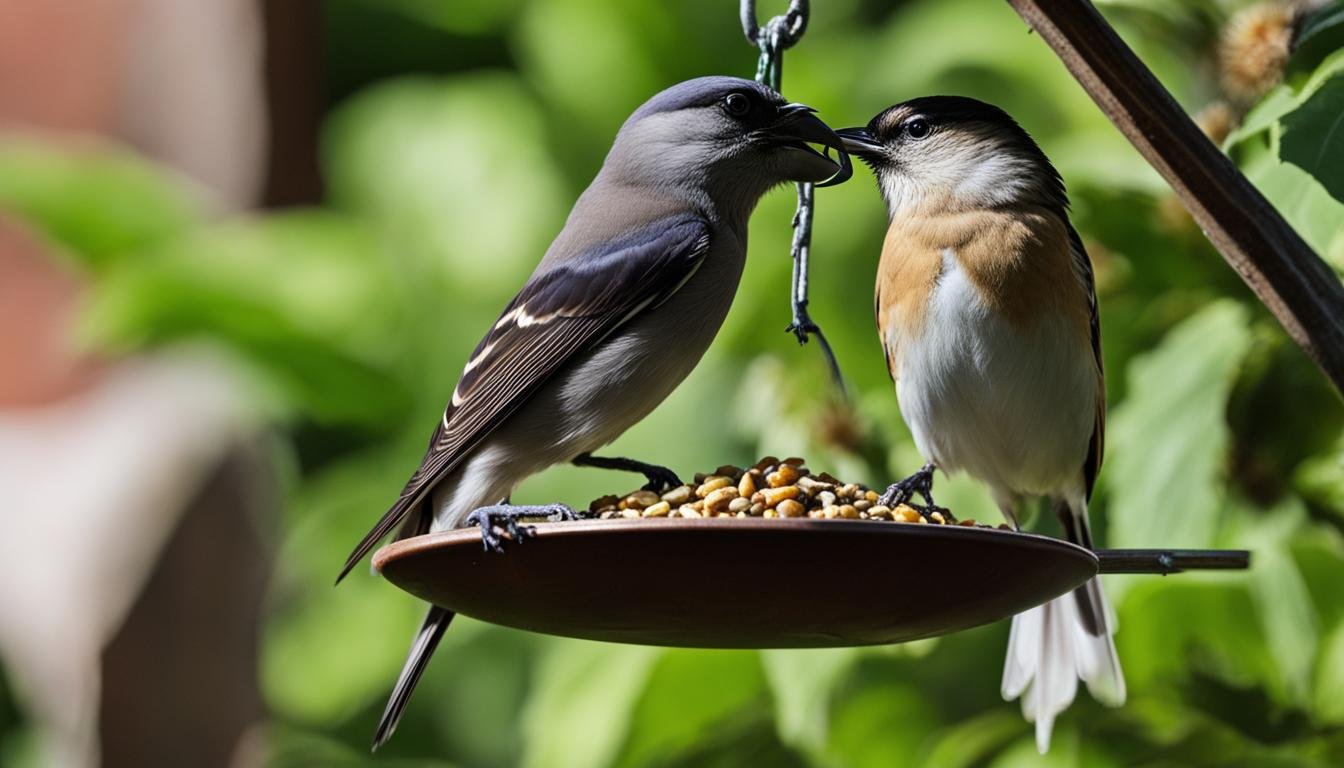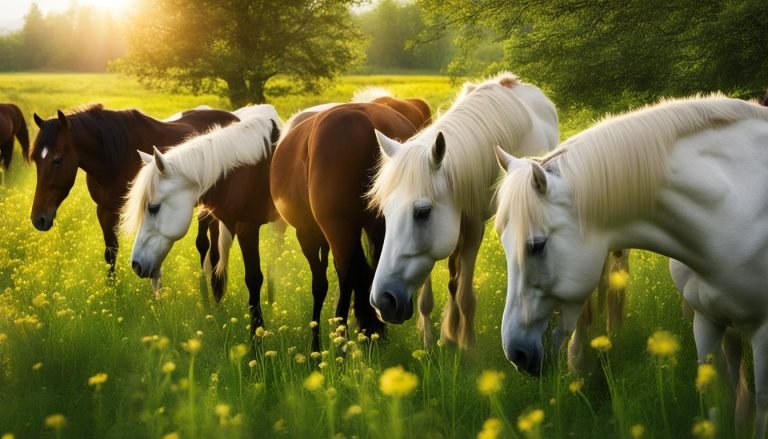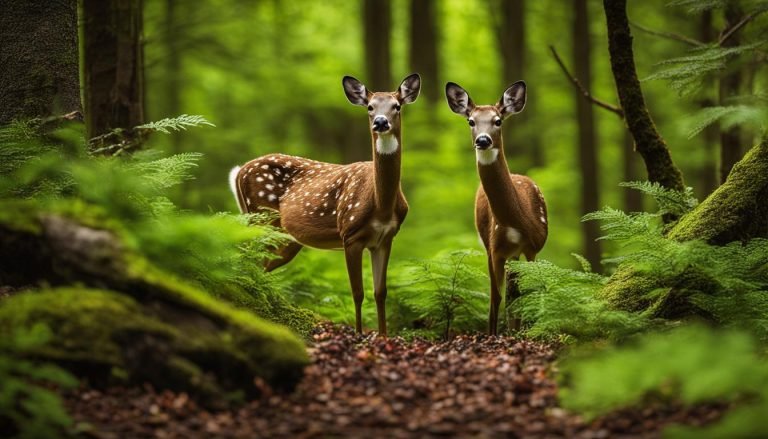What Do Birds Eat? The Ultimate Guide to Avian Diets
As a bird enthusiast, you may have wondered, “What do birds eat?”
Well, wonder no more! In this comprehensive guide, we’ll explore the diverse diets of birds and discuss various bird food options.
From seeds and grains to insects, fruits, and nectar, birds’ diets are as varied as the species themselves. Understanding the nutritional requirements and feeding habits of different bird species is essential to their health and well-being.
Whether you’re interested in attracting a variety of bird species to your backyard feeding station or providing a natural food source for your feathered friends, this guide has got you covered. So, let’s dive in and explore the fascinating world of avian diets and bird food options!
Key Takeaways:
- There are many different bird food options available for pet birds and those in the wild.
- Understanding the nutritional requirements and feeding habits of different bird species is essential to their health and well-being.
- Bird diets can be supplemented with commercial foods, such as pellets and formulated diets.
- Seeds and grains are a common dietary component for many bird species.
- Insects and invertebrates are rich sources of protein for birds.
Bird Quiz
How well do you know birds? Test your knowledge below!

Understanding Avian Diets

As a bird enthusiast, it’s essential to understand the basics of avian diets. Knowing what birds eat and how they feed is essential for providing the right nutrition to your feathered friends and attracting different bird species to your backyard.
Bird Nutrition Facts
Birds have unique nutritional needs, and their diets vary depending on their species, habitat, and behavior. Most birds require a balanced diet that includes proteins, carbohydrates, vitamins, and minerals.
Proteins are essential for skeletal and muscle growth, while carbohydrates provide energy and fuel. Vitamins and minerals are necessary for metabolic processes and overall health.
Birds have a high metabolic rate, which means they need to eat frequently to maintain their energy levels. Some bird species may require a different diet during breeding and migration seasons, depending on their nutrient needs.
Bird Feeding Habits
Birds have different feeding habits and use various techniques to obtain food. Some birds are carnivorous and feed on insects, small animals, and other birds, while others are herbivorous and feed on plants, seeds, and fruits.
Some birds are omnivorous, which means they eat both plants and animals. The feeding habits of birds can also vary based on their habitat and behavior.
For example, ground-feeding birds, such as quails and doves, forage on the ground for seeds and insects, while tree-dwelling birds, such as woodpeckers and nuthatches, feed on insects and sap from trees.
Birds have evolved unique adaptations to help them obtain food and survive in their environments. For example, some birds, such as eagles, have sharp talons and beaks to hunt and kill prey, while others, such as hummingbirds, have long, slender beaks to obtain nectar from flowers.
Now that we have a basic understanding of bird nutrition facts and bird feeding habits, we can move on to exploring the natural diets of wild birds in the next section.
Natural Diets of Wild Birds
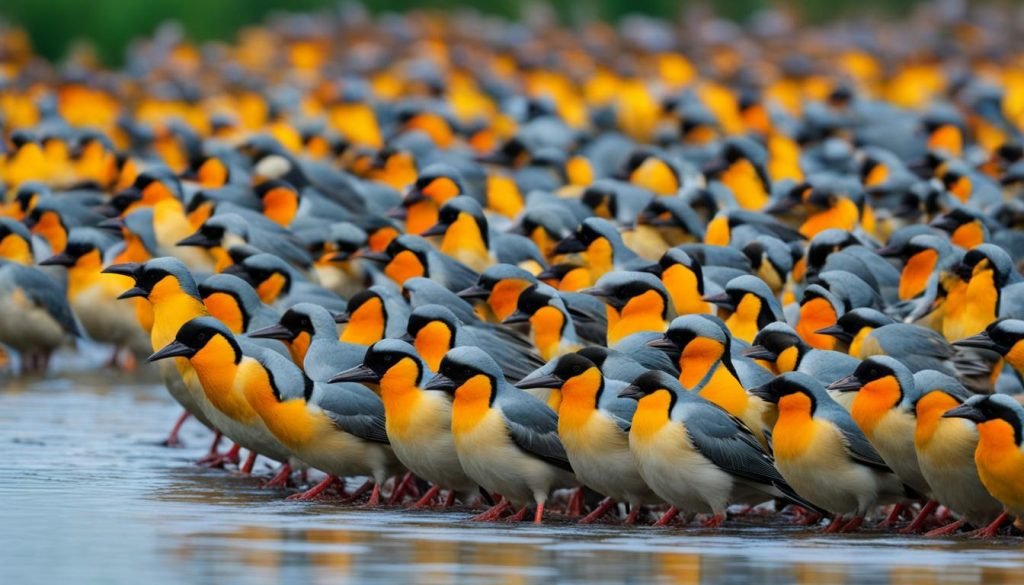
Wild birds thrive on a diet that is natural to their habitats. For example, seed-eating birds consume a variety of seeds from different plants found in the wild. Insects and invertebrates are also common components of many bird diets.
Additionally, birds that live in areas with abundant fruit-bearing trees and shrubs benefit from the nutritional value of fruits and berries.
The natural diets of wild birds vary widely depending on factors such as habitat, climate, and geographic location. Some birds, such as the American Goldfinch, have a specialized diet that consists mostly of seeds.
Goldfinches are particularly fond of thistle seeds, which they consume in large quantities.
| Bird Species | Natural Diet |
|---|---|
| Woodpeckers | Insects, nuts |
| Bluebirds | Insects, berries, fruit |
| Hummingbirds | Nectar |
As you can see, different bird species have unique dietary requirements. Therefore, it’s important to understand the natural diet of the birds you want to attract to your yard and provide appropriate food sources.
In addition to offering natural food sources, it’s also crucial to create a safe and inviting environment for birds. This includes providing shelter, clean water, and protection from predators.
Bird Feeders and Backyard Feeding
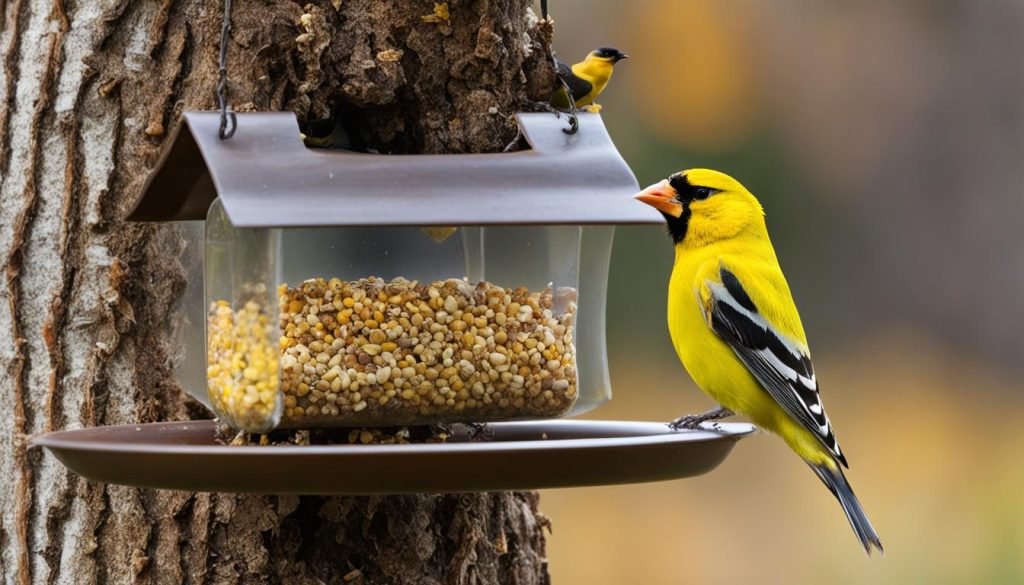
As a bird enthusiast, I love attracting feathered friends to my backyard. One of the best ways to do this is by providing supplemental bird feed through feeders. But with so many bird food options available, it can be overwhelming to choose the best bird feed for different bird species.
Let’s first discuss the types of bird feeders available. The most common bird feeders include hopper feeders, tube feeders, suet feeders, and platform feeders. Each feeder type serves a specific purpose and attracts different bird species.
For example, suet feeders are excellent for attracting woodpeckers, while hummingbirds prefer nectar feeders.
Once you’ve chosen the right feeder type, it’s time to select the best bird feed. When selecting bird food options, consider the nutritional value and the bird species you want to attract. Sunflower seeds and millet are popular options for many bird species, while thistle seeds are preferred by finches.
To create a well-rounded diet for backyard birds, it’s essential to supplement seed diets with other food sources. Birds also need access to insects, fruits, and berries for optimal nutrition.
| Bird Food Options | Best Bird Feed for… |
|---|---|
| Sunflower Seeds | Sparrows, Cardinals, Chickadees |
| Millet | Doves, Quails, Sparrows |
| Thistle Seeds | Finches, Redpolls |
It’s also crucial to maintain a clean and hygienic feeding station. Regularly clean feeders and remove any moldy or spoiled food to prevent the spread of diseases among birds.
“Feeding birds in your backyard is a great way to connect with nature and enjoy the beauty of these amazing creatures.”
Seeds and Grains in Bird Diets
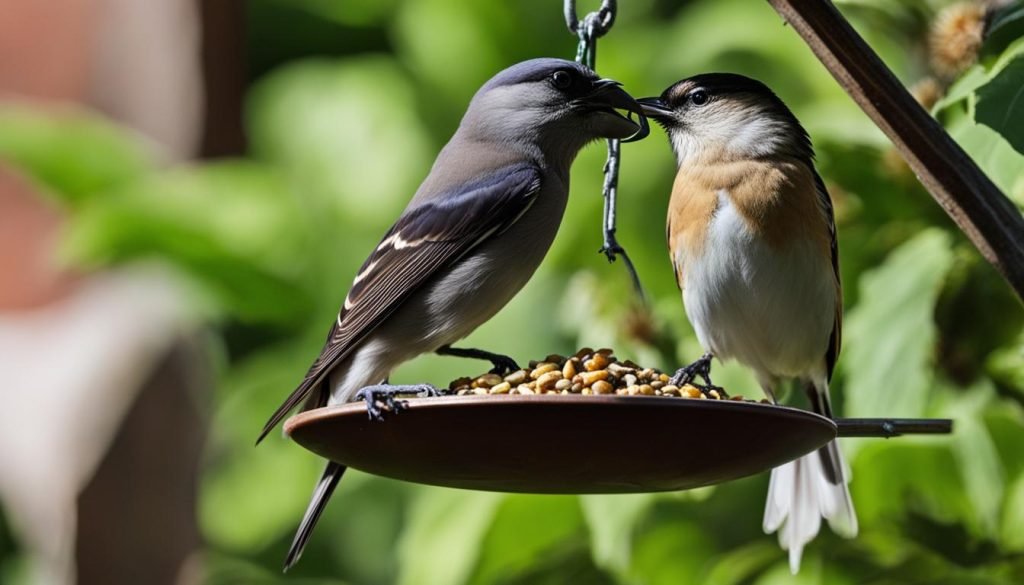
When it comes to birds’ diets, seeds and grains are a staple for many species. These foods provide essential carbohydrates for energy and some protein as well. However, not all seeds are created equal, and different birds have varying preferences and nutritional requirements.
Some birds are known as granivores, which means they consume primarily seeds. These birds have special adaptations such as thick, muscular bills that can crack open hard seed shells. Others, like finches, have specialized bills that allow them to extract seeds from cones or pine trees.
The Nutritional Value of Seeds
Seeds come in many forms, including sunflower seeds, millet, safflower seeds, and more. Each type of seed has a unique nutritional composition, so offering a variety of seeds is essential for a well-rounded diet.
| Seed Type | Nutritional Value |
|---|---|
| Sunflower Seeds | High in fat, protein, and fiber; good source of Vitamin E |
| Millet | Low in fat, high in carbohydrates; good source of B vitamins |
| Safflower Seeds | High in fat, protein, and fiber; good source of Vitamin B6 |
While seeds are an important part of a bird’s diet, it’s important to note that they should be supplemented with other foods as well. Birds that eat only seeds can become malnourished, as seeds lack many essential vitamins and minerals. (bird nutrition facts)
Choosing the Best Seeds for Your Backyard Birds
When selecting seeds for your backyard feeder, opt for high-quality, fresh seeds from a trusted supplier. Look for seeds that are free from dust and debris and have a high moisture content to ensure maximum freshness.
Black oil sunflower seeds are a popular choice among many backyard birds, including finches, chickadees, and cardinals. Millet is another commonly offered seed, favored by sparrows and doves. Nyjer seeds are another favorite of finches and other small birds. (bird food options)
When offering seeds to your backyard birds, be sure to provide them in a suitable feeder. Tube feeders are ideal for many species, while hopper feeders work well for larger birds like jays and pigeons.
Insects and Invertebrates for Bird Diets
Did you know that many bird species rely on insects and invertebrates as a primary food source? Not only are these creatures high in protein, but they also provide essential vitamins and minerals that birds need to thrive.
From beetles to worms and spiders to snails, there are countless types of insects and invertebrates that birds consume in the wild. Different bird species have unique preferences, so it’s essential to understand which insects attract specific birds. For example, bluebirds are attracted to mealworms, while orioles prefer caterpillars and spiders.
If you want to provide insects as a natural food source for your backyard birds, there are several ways to do so. You can create a small insect garden with plants that attract and host insects, such as dill, fennel, or milkweed. Alternatively, you can purchase live or dried insects from a pet store or online retailer.
While insects and invertebrates are a valuable component of a bird’s diet, they should always be offered in conjunction with other food sources. It’s essential to provide a varied diet that includes seeds, fruits, and commercial bird feed to ensure that birds receive all the nutrients they need.
Attracting Insects to Your Backyard
Creating an insect-friendly garden is a great way to attract a diverse range of insects to your backyard. Here are some tips to get started:
- Plant a variety of plants with different flower shapes, colors, and sizes. This diversity will attract a range of pollinators and other beneficial insects.
- Include native plants in your garden, as they are often better adapted to the local ecosystem and attract native species of insects.
- Include plants with different blooming times to provide a consistent food source for insects throughout the growing season.
- Provide a water source, such as a bird bath or shallow dish, for insects to drink from.
Fruits and Berries in Bird Diets
Fruits and berries are a delicious and nutritious component of the diets of many bird species. These foods provide a range of essential vitamins and minerals, including vitamin C, vitamin A, and potassium.
Some of the most popular fruits consumed by birds include apples, cherries, grapes, and oranges. Many species of birds also enjoy berries, such as blueberries, raspberries, and strawberries.
When it comes to attracting birds to your backyard, offering fresh fruit is an excellent choice. You can place sliced fruit on a feeding platform, or place whole fruit on a skewer. Birds will also be attracted to fruit trees and berry bushes in your yard.
Birds Attracted to Fruits and Berries
Many species of birds are drawn to fruits and berries, including:
- Orioles
- Thrushes
- Robins
- Waxwings
- Mockingbirds
- Cedar Waxwings
- Bluebirds
- Tanagers
By offering a variety of fruits and berries, you can attract a diverse array of bird species to your yard and provide them with the necessary nutrients to thrive.
Supplementing with Fruits and Berries
While offering fresh fruit is an excellent way to attract birds, it’s also important to supplement their diet with other food sources. Fruits and berries are high in sugar, and if birds consume an excessive amount, it may negatively impact their health.
To provide a balanced diet, consider incorporating other food sources, such as insects, seeds, and nectar, into their feeding routine.
“Fruits and berries are a delicious and nutritious component of the diets of many bird species.”
Fruits and berries are an essential component of many bird diets, providing a range of essential nutrients and attracting a diverse array of bird species.
Nectar-Feeding Birds and Their Diets
As I mentioned earlier, some bird species, such as hummingbirds, rely heavily on nectar as their primary food source. Nectar contains sugar, which provides energy for these birds’ fast metabolism.
To attract nectar-feeding birds to your yard, it’s essential to provide them with the appropriate food sources. You can make a simple nectar recipe at home by mixing one part white granulated sugar with four parts clean water.
Boil the mixture for two minutes, let it cool, and fill your bird feeder. Remember to clean the feeder regularly to avoid mold growth and bacteria that can harm the birds.
It’s important to note that nectar should not be the sole component of a hummingbird’s diet. These tiny birds also need protein and other nutrients found in insects. Supplementing their diets with fruit flies, gnats, and other small insects are essential for their survival.
Important Nutrition Facts
Here are some essential nutrition facts to keep in mind when feeding nectar-feeding birds:
- Nectar should contain a 4:1 water-to-sugar ratio
- Do not use honey or artificial sweeteners in the nectar
- Change the nectar solution every three to five days
- Clean the feeder regularly with hot water and soap
Fun Fact
Did you know that hummingbirds’ wings beat at an average of 80 beats per second and up to 200 beats per second during courtship displays? These incredible birds are fascinating to watch and enjoy in your backyard.
Supplementing Bird Diets with Commercial Foods
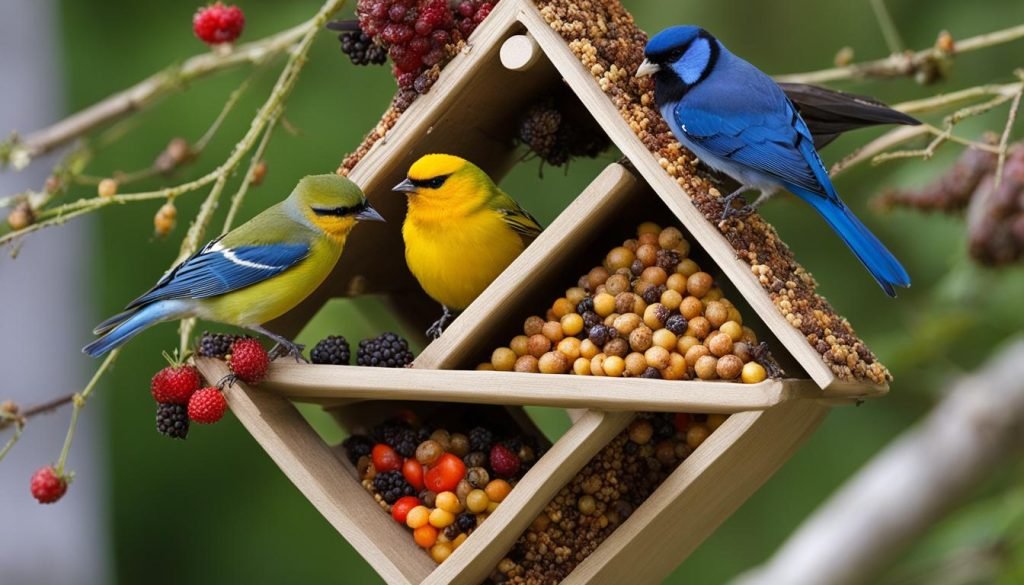
If you’re looking to supplement your feathered friend’s diet, commercially available bird food is a great option. With so many bird food options available, it can be challenging to choose the best bird feed for your bird species.
Benefits of Commercial Bird Foods
Commercially formulated diets are specially designed to meet the nutritional needs of different bird species. These foods offer a complete and balanced diet, free from any additives or preservatives that may be harmful to birds. They are also convenient and easy to store, making them a popular choice among bird owners.
Choosing the Best Bird Feed
When selecting commercially available bird food, it’s essential to consider your bird’s dietary needs. Choose a food that is appropriate for your bird species and their stage of life. Pellets and formulated diets are excellent for birds that primarily eat seeds, while insectivorous birds may require specialized diets containing insects or mealworms.
Incorporating Commercial Foods into Your Bird’s Diet
To incorporate commercial bird food into your bird’s diet, start by gradually introducing it into their feeding routine. Mix small amounts of the new food with their existing diet and gradually increase the amount over time. Monitor your bird’s weight and overall health to ensure that the new food is well-tolerated.
More About Birds
- How Do Birds Mate? – Learn More About Birds
- How Long Do Birds Live? Avian Lifespan
- 15 Facts About Birds That Will Surprise You
- Bird Quiz: How Well Do You Know Birds?
Frequently Asked Questions
What do birds eat?
Birds have diverse diets that vary depending on their species. Some common food options for birds include seeds, insects, fruits, berries, and nectar.
How do I provide the best bird feed?
To provide the best bird feed, it’s important to offer a variety of food options that cater to different bird species. This can include seed mixes, suet, mealworms, fruits, and nectar feeders.
Do all birds have the same nutritional needs?
No, different bird species have unique nutritional needs. It’s essential to research the specific dietary requirements of the birds you want to attract and provide them with suitable food sources.
What are the natural diets of wild birds?
Wild birds have natural diets that consist of foods found in their habitats, such as seeds, insects, fruits, and nectar. They forage and adapt their diets based on the availability of these natural food sources.
How can I attract birds to my backyard?
You can attract birds to your backyard by providing a variety of food sources, including different types of bird feeders, seed mixes, suet, and nectar feeders. Creating a welcoming environment with shelter and water sources can also help attract birds.
What types of seeds and grains should I offer to birds?
Different bird species have preferences for specific seed types. Common seed options include sunflower seeds, millet, and nyjer seeds. Research the seed preferences of the birds you want to attract and provide suitable options.
Are insects important in bird diets?
Yes, insects are important in bird diets as they provide a valuable source of protein. Many bird species rely on insects as a primary food source, especially during nesting seasons.
Can I feed fruits and berries to birds?
Yes, fruits and berries are nutritious options for many bird species. Offer a variety of fruits, such as apples, oranges, and berries, to attract birds that enjoy these food sources.
What should I feed nectar-feeding birds?
Nectar-feeding birds, like hummingbirds, require a special diet of nectar. You can provide them with a homemade nectar solution made of sugar and water or use commercially available nectar solutions.
Should I supplement bird diets with commercial foods?
Supplementing bird diets with commercial foods can be beneficial as they provide additional nutrients. Choose high-quality commercial bird foods, such as pellets or formulated diets, that are appropriate for the specific bird species you want to feed.

